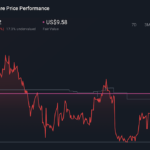
U.S. stocks slumped Friday, ending a two week win streak, as the spread of the COVID-19 epidemic from China to neighboring countries amplified worries about the impact on supply chains and global economic growth.
Tech shares were the biggest loser in the S&P 500 index, with the sector closing down 2% as investors weighed potential fallout resulting from the corornavirus.
How did benchmarks fare?
The Dow Jones Industrial Average DJIA, -0.78% closed below 29,000, shedding 227.51 points, or 0.8%, at 28,992.40, its worst one-day percentage drop since Feb. 7. The S&P 500 SPX, -1.05% lost 35.48 points, or 1.1%, to settle at 3,337.75, its biggest one-day percentage decline since Jan. 31. The Nasdaq Composite Index COMP, -1.79% lost 174.37 points, or 1.8%, to finish at 9,576.59, its worst single-day percentage fall since Jan. 27, according to Dow Jones Market Data.
For the week, the Nasdaq Composite lost 1.6%, while the Dow fell 1.4% and the S&P 500 shed 1.3%, snapping a two-week win streak for each benchmark.
What drove the market?
Shares of Microsoft Corp. MSFT, -3.16%, Apple Inc. AAPL, -2.26% and Intel Corp. INTC, -1.70% weighed on the Dow, as investors grew increasingly wary about potential fallout from the COVID-19 outbreak.
Stocks also came under pressure after IHS Markit said business in the U.S. contracted in February for the first time in four years owing to disruptions caused by the coronavirus and growing angst over the outcome of the 2020 presidential election. The forecasting firm said its activity indexes for both manufacturers and service-oriented firms declined this month. And the service sector index turned negative for the first time since 2015. In a big surprise, the index covering the large service side of the economy sank 4 points to 49.4, IHS Markit said Friday. A reading of less than 50 indicates a contraction in activity.
The spread of the virus inside and outside of China has been unsettling the market lately, likely contributing to gains in havens like government bonds and gold, with investors showing reluctance to hold on to equities heading into the weekend.
“The coronavirus outbreak contains a significant likelihood of impact to the global economy and the potential to become a black-swan type event,” warned Bank of America Global Research rates strategist Bruno Braizinha, in a client note Friday.
“The uncertainty has been reflected in the market and has naturally led to an increase in recession probabilities.”
Read: Fed’s Brainard backs deploying untested monetary-policy plan in next recession
Economists at Standard Chartered Bank on Friday estimated that COVID-19 epidemic could affect 30% of China’s imports and 10% of its exports, prompting them to lower their gross domestic product forecast for China this year to 5.5% from 5.8%.
South Korea has reported 48 more cases, bring its total infections from the novel coronavirus to 204, and in Japan, officials from Tokyo and Osaka said they wouldn’t hold large events such as school graduation ceremonies and entrance examinations for three weeks through mid-March, in an effort to contain the viral outbreak, The Wall Street Journal reported.
Meanwhile, the World Health Organization said Friday that there are 76,767 confirmed cases of the illness and 2,247 deaths, marking another day in which the number of new cases world-wide has slowed.
The full economic impact of the disease is unclear but early indications suggest that it is already denting China’s car sales. Chinese passenger car sales data for the first two weeks of February showed a year-over-year decline of 92%, Bloomberg News reported. And in the first 16 days of the month, only about 5,000 passenger cars were sold compared with nearly 60,000 in the same period of last year, the data showed.
“Nobody has a really good handle on just what the impact is on supply chains,” Luke Tilley, chief economist of Wilmington Trust, told MarketWatch. “Individual companies can identify their supply chains, but they aren’t as easily capable of identifying the next links down the chain. That makes it hard to peg the overall impact,” he said. “It’s understandable that some investors are moving to a risk-off mode.”
Separately, Coca-Cola KO, +0.69% said it estimates an approximate 2- to 3-point impact to unit case volume, 1- to 2-point impact to organic revenue and 1- to 2-penny impact to earnings per share for the first quarter, citing coronavirus. China ranks as the third-largest market in the world in terms of unit case volume. Shares gained 0.4%.
In other economic data, U.S. existing home sales fell 1.3% in January to a 5.46 million annual rate.
Which stocks were in focus?
- Deere & Co. DE, +7.00% said fiscal first-quarter to Feb. 2 net income rose 4% to $517 million, or $1.63 a share, while sales fell 4% to $7.63 billion. Shares gained 7%.
- Shares of Virgin Galactic Holdings Inc. SPCE, -9.10% lost 9.1% after a powerful rally this week. Shares remain up 17.6% for the week.
- T-Mobile US Inc. TMUS, -0.93% shares declined 0.9% after it revised its merger terms with Sprint Corp. S, +6.01%
- Shake Shack SHAK, -2.40% shares fell 2.4% after the burger chain was downgraded by SunTrust Robinson Humphrey on guidance fears.
- Shares of Dropbox Inc. DBX, +19.96% surged 20% Friday, after one analyst called the cloud-storage company’s quarterly earnings and forward-looking commentary “potentially thesis-changing.”
- Ebay Inc. EBAY, +1.35% shares rose 1.4% Friday, following a Wall Street Journal report said there could potentially be a sale of the e-commerce company’s classified ad business, which operates mostly outside of the U.S.
- Shares of Advanced Micro Devices Inc. AMD, -6.97% fell almost 7% Friday, even though credit-rating agency S&P Global upgraded the semiconductor company one notch to BB from BB-, citing progress by the company in reducing its debt load. Shares closed at a record Wednesday.
- National CineMedia Inc. NCMI, +17.13% share soared 17.1% Friday, after the company posted net income that beat consensus and voted to increase its quarterly cash dividend.
- Wells Fargo & Co. WFC, +0.76% shares gained 1.5% after the bank paid $3 billion to settled a probe into the creation of fake-accounts to boost profits, which was brought by the U.S. Securities and Exchange Commission and Department of Justice.
How did other assets perform?
The price of a barrel of West Texas Intermediate crude for April delivery CLJ20, -0.78% on the New York Mercantile Exchange fell 50 cents, or 0.9%, to settle at $53.38 a barrel, amid fears that cracks may be formingin the Saudi Arabia and Russia alliance over how far to cut oil production.
See: What a breakdown in the Saudi-Arabia-Russia oil alliance would mean to the market
Gold for April delivery GCJ20, +1.57% gained almost 1.8% to settle at $1,648.80 an ounce on Comex Friday, putting it 3.9% higher for the week, its biggest weekly gain in eight months.
The benchmark U.S. 10-year Treasury note TMUBMUSD10Y, -2.90% shed 5.4 basis points to a more than five-month low of 1.470% while the yield on the 30-year T-bond TMUBMUSD30Y, -2.32% extended its retreat to an all-time low. Bond yields fall when prices rise.
In Europe, the Stoxx Europe 600 SXXP, -0.49% fell 0.5%, while the FTSE 100 UKX, -0.44% lost 0.4%.
Trade was mixed in Asia overnight. The China CSI 300 000300, +0.12% rose 0.1%, Hong Kong’s Hang Seng Index HSI, -1.09% fell 1.1%, while the Shanghai Composite SHCOMP, +0.31% advanced 0.3%. Japan’s Nikkei NIK, -0.39% retreated 0.4%, while South Korea’s Kospi 180721, -1.49% tumbled 1.5%.
div > iframe { width: 100% !important; min-width: 300px; max-width: 800px; } ]]>







